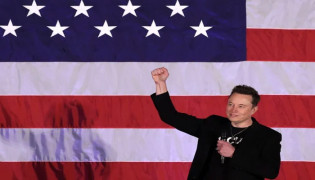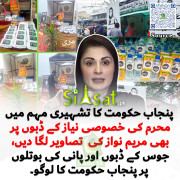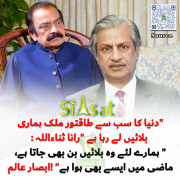nation1857
Politcal Worker (100+ posts)
A nervous looking Pakistani soldier pointed a rocket-propelled grenade at our pickup truck in late January. The Taliban guard beside me loaded
his rifle and ordered me to put a scarf over my face. In the drivers seat was Badruddin Haqqani, a senior commander of the Haqqani network, one of the Talibans most hard-line factions and the group that was holding me and two Afghan colleagues hostage in Pakistans tribal areas.
Obeying the guard, I covered my face. The soldier was in the lead vehicle of a Pakistani army supply convoy in North Waziristan. After surveying the road, the soldier got back in his truck, and the convoy rumbled forward. I hoped that the Pakistanis might somehow rescue us. Instead, I watched in dismay as Badruddin got out of the truck and calmly stood on the side of the road. After the convoy disappeared, Badruddin seemed amused.
Do you know who that was? he asked me.
No, I said, trying to play dumb.
That was the Pakistani army, he said.
He explained that under a ceasefire agreement between the Taliban and the army, all civilians were required to get out of their cars when an army convoy approached. For Taliban vehicles, though, only the driver had to get out. The practice, I realized, allowed the Taliban to hide kidnapping victims and foreign militants from the Pakistani army.
That morning, Badruddin arrived at the house in Miram Shah where I was being held with Tahir Luddin, an Afghan journalist, and Asad Mangal, our driver. We had been taken hostage on a reporting trip south of Kabul, Afghanistan, in November 2008 and moved to Pakistans tribal areas.
Badruddin announced that he was taking us out of town to a snow-covered hillside to shoot the final scene of a video that would be released to the media. He was determined to make it look as though we were being held in the frigid mountains of Afghanistan, not in a bustling city in Pakistan.
The trip confirmed suspicions I had harbored for years as a reporter. The Haqqanis oversaw a sprawling Taliban mini-state in the tribal areas with the de facto acquiescence of the Pakistani military. The Haqqanis were so confident of their control of the area that they took me to a person they considered to be an extraordinarily valuable hostage on a three-hour drive in broad daylight to shoot a scene for a video outdoors.
In our day to day existence, when commanders were absent, some of our guards showed glimpses of humanity. Those moments gave us hope that we might somehow be able to talk or reason our way out of captivity.
In early February, our guards told us that Badruddin had sent the video to Afghan and foreign media outlets but that only Al Jazeera had broadcast it. The news frustrated Tahir and Asad, who had hoped that the video would be widely broadcast and stimulate negotiations.
I was not surprised. I had heard before our abduction that the Afghan and foreign news media had struck an informal agreement not to publicize the kidnappings of journalists in Afghanistan if their organization requested it. Keeping the kidnappings out of the news, it was hoped, would decrease the expectations of hostage-takers that they could garner vast amounts of publicity or ransom for journalists.
After news outlets declined to show the video, we asked our guards to call Abu Tayyeb, the Taliban commander who had abducted us outside Kabul and concealed his identity. He agreed to return to Miram Shah and said he would try to negotiate a ransom with my family.
Tahir, Asad and I had received comforting letters from our families through the International Committee of the Red Cross. But I hadnt spoken to my wife, Kristen, in three months. Finally, on February 16, Abu Tayyeb drove me to a remote location and allowed me to call her. The Taliban told me to give her the number of their cellphone and have her call us back. They were demanding $7 million at that point but were too cheap to pay for the phone call.
This is my last call, I said to her, repeating what they had told me to say. This is our last chance.
One morning, Abu Tayyeb wept at news that a Nato airstrike had killed women and children in southern Afghanistan. A guard explained to me that Abu Tayyeb reviled the US because of the civilian deaths. One evening, Abu Tayyeb declared that the Taliban treated women better than Americans did. He said women in the US were forced to wear revealing clothes and define themselves solely as sex objects. The Taliban protected womens honor by not allowing them to appear in public with their faces unveiled.
Most of the guards were Afghans in their late 20s and early 30s. Some had grown up as refugees in Pakistan. All had limited educations from government schools or madrassas. None had seen the world beyond Afghanistan and Pakistan. They all had relatives or friends who had been killed by Soviet or US troops. They grew up in a culture where teenage boys reached manhood and made a name for themselves by showing their bravery.
I tried to get to know one of the guards, who was preparing to be a suicide bomber. A young man in his 20s with a slim build and brown eyes, he said he had studied engineering in high school. When I asked him why he wanted to die, he replied that living in this world was a burden for any true Muslim. Heaven was his goal, he said.
My captors railed against the evils of a secular society. In March, they celebrated a suicide attack in a mosque in Jamrud that killed as many as 50 worshippers as they prayed. Those living under Pakistans apostate government, they said, deserved it. One commander declared that no true Muslim could live in a state where Islam was not the official religion. Citing the Talibans interpretation of Islam, he said it was every Muslims duty to try to stop others from sinning.
After we had been held for months in captivity, my kidnappers demanded that I stop washing the groups dishes because they did not want to catch my diseases. They believed that problems I was having with my stomach stemmed from my being an inherently unclean non-Muslim, not from unhygienic water.
Pressing me to convert, one commander ordered me to read a passage of the Koran each day and discuss it with him at night. He dismissed my arguments that a forced conversion was not legitimate. He and the guards politely said they felt sorry for me. If I failed to convert, they said, I would suffer excruciating pain in the fires of hell.
At one point, a visiting fighter demanded to know why I would not obey. He said that if it were up to him, he would take me outside and offer me a final chance to convert. If I refused, he would shoot me.
One young fighter showed a different side. He refused to carry out a commanders order to kidnap a foreigner working in Afghanistan.
During our months in Miram Shah, patterns emerged. When certain commanders visited, the atmosphere was tense, and discussions centered on what they saw as Western injustices against Muslims. When we were alone with the guards who lived with us, moments of levity emerged.
They searched for ways to break the monotony. After dinner on many winter nights, my guards sang Pashto songs for hours. My voice and Pashto pronunciation were terrible, but our guards urged me to sing along. The ballads varied. On some evenings, I found myself reluctantly singing Taliban songs that declared that you have atomic bombs, but we have suicide bombers.
On other nights, at my guards urging, I switched to American tunes. I realized that my guards, too, might have needed a break from our grim existence. But I felt like a performing monkey when they told me to sing for visiting commanders. I knew they were simply laughing at me.
The Beatles song She Loves You, which popped into my head soon after I received my wifes letter from the Red Cross, was the most popular. For reasons that baffled me, the guards relished singing it with me. I began by singing its first verse. My three Taliban guards, along with Tahir and Asad, then joined me in the chorus. She loves you yeah, yeah, yeah, we sang, with Kalashnikovs lying on the floor around us
David Rohde, NYT News Service 21 October 2009
his rifle and ordered me to put a scarf over my face. In the drivers seat was Badruddin Haqqani, a senior commander of the Haqqani network, one of the Talibans most hard-line factions and the group that was holding me and two Afghan colleagues hostage in Pakistans tribal areas.
Obeying the guard, I covered my face. The soldier was in the lead vehicle of a Pakistani army supply convoy in North Waziristan. After surveying the road, the soldier got back in his truck, and the convoy rumbled forward. I hoped that the Pakistanis might somehow rescue us. Instead, I watched in dismay as Badruddin got out of the truck and calmly stood on the side of the road. After the convoy disappeared, Badruddin seemed amused.
Do you know who that was? he asked me.
No, I said, trying to play dumb.
That was the Pakistani army, he said.
He explained that under a ceasefire agreement between the Taliban and the army, all civilians were required to get out of their cars when an army convoy approached. For Taliban vehicles, though, only the driver had to get out. The practice, I realized, allowed the Taliban to hide kidnapping victims and foreign militants from the Pakistani army.
That morning, Badruddin arrived at the house in Miram Shah where I was being held with Tahir Luddin, an Afghan journalist, and Asad Mangal, our driver. We had been taken hostage on a reporting trip south of Kabul, Afghanistan, in November 2008 and moved to Pakistans tribal areas.
Badruddin announced that he was taking us out of town to a snow-covered hillside to shoot the final scene of a video that would be released to the media. He was determined to make it look as though we were being held in the frigid mountains of Afghanistan, not in a bustling city in Pakistan.
The trip confirmed suspicions I had harbored for years as a reporter. The Haqqanis oversaw a sprawling Taliban mini-state in the tribal areas with the de facto acquiescence of the Pakistani military. The Haqqanis were so confident of their control of the area that they took me to a person they considered to be an extraordinarily valuable hostage on a three-hour drive in broad daylight to shoot a scene for a video outdoors.
In our day to day existence, when commanders were absent, some of our guards showed glimpses of humanity. Those moments gave us hope that we might somehow be able to talk or reason our way out of captivity.
In early February, our guards told us that Badruddin had sent the video to Afghan and foreign media outlets but that only Al Jazeera had broadcast it. The news frustrated Tahir and Asad, who had hoped that the video would be widely broadcast and stimulate negotiations.
I was not surprised. I had heard before our abduction that the Afghan and foreign news media had struck an informal agreement not to publicize the kidnappings of journalists in Afghanistan if their organization requested it. Keeping the kidnappings out of the news, it was hoped, would decrease the expectations of hostage-takers that they could garner vast amounts of publicity or ransom for journalists.
After news outlets declined to show the video, we asked our guards to call Abu Tayyeb, the Taliban commander who had abducted us outside Kabul and concealed his identity. He agreed to return to Miram Shah and said he would try to negotiate a ransom with my family.
Tahir, Asad and I had received comforting letters from our families through the International Committee of the Red Cross. But I hadnt spoken to my wife, Kristen, in three months. Finally, on February 16, Abu Tayyeb drove me to a remote location and allowed me to call her. The Taliban told me to give her the number of their cellphone and have her call us back. They were demanding $7 million at that point but were too cheap to pay for the phone call.
This is my last call, I said to her, repeating what they had told me to say. This is our last chance.
One morning, Abu Tayyeb wept at news that a Nato airstrike had killed women and children in southern Afghanistan. A guard explained to me that Abu Tayyeb reviled the US because of the civilian deaths. One evening, Abu Tayyeb declared that the Taliban treated women better than Americans did. He said women in the US were forced to wear revealing clothes and define themselves solely as sex objects. The Taliban protected womens honor by not allowing them to appear in public with their faces unveiled.
Most of the guards were Afghans in their late 20s and early 30s. Some had grown up as refugees in Pakistan. All had limited educations from government schools or madrassas. None had seen the world beyond Afghanistan and Pakistan. They all had relatives or friends who had been killed by Soviet or US troops. They grew up in a culture where teenage boys reached manhood and made a name for themselves by showing their bravery.
I tried to get to know one of the guards, who was preparing to be a suicide bomber. A young man in his 20s with a slim build and brown eyes, he said he had studied engineering in high school. When I asked him why he wanted to die, he replied that living in this world was a burden for any true Muslim. Heaven was his goal, he said.
My captors railed against the evils of a secular society. In March, they celebrated a suicide attack in a mosque in Jamrud that killed as many as 50 worshippers as they prayed. Those living under Pakistans apostate government, they said, deserved it. One commander declared that no true Muslim could live in a state where Islam was not the official religion. Citing the Talibans interpretation of Islam, he said it was every Muslims duty to try to stop others from sinning.
After we had been held for months in captivity, my kidnappers demanded that I stop washing the groups dishes because they did not want to catch my diseases. They believed that problems I was having with my stomach stemmed from my being an inherently unclean non-Muslim, not from unhygienic water.
Pressing me to convert, one commander ordered me to read a passage of the Koran each day and discuss it with him at night. He dismissed my arguments that a forced conversion was not legitimate. He and the guards politely said they felt sorry for me. If I failed to convert, they said, I would suffer excruciating pain in the fires of hell.
At one point, a visiting fighter demanded to know why I would not obey. He said that if it were up to him, he would take me outside and offer me a final chance to convert. If I refused, he would shoot me.
One young fighter showed a different side. He refused to carry out a commanders order to kidnap a foreigner working in Afghanistan.
During our months in Miram Shah, patterns emerged. When certain commanders visited, the atmosphere was tense, and discussions centered on what they saw as Western injustices against Muslims. When we were alone with the guards who lived with us, moments of levity emerged.
They searched for ways to break the monotony. After dinner on many winter nights, my guards sang Pashto songs for hours. My voice and Pashto pronunciation were terrible, but our guards urged me to sing along. The ballads varied. On some evenings, I found myself reluctantly singing Taliban songs that declared that you have atomic bombs, but we have suicide bombers.
On other nights, at my guards urging, I switched to American tunes. I realized that my guards, too, might have needed a break from our grim existence. But I felt like a performing monkey when they told me to sing for visiting commanders. I knew they were simply laughing at me.
The Beatles song She Loves You, which popped into my head soon after I received my wifes letter from the Red Cross, was the most popular. For reasons that baffled me, the guards relished singing it with me. I began by singing its first verse. My three Taliban guards, along with Tahir and Asad, then joined me in the chorus. She loves you yeah, yeah, yeah, we sang, with Kalashnikovs lying on the floor around us
David Rohde, NYT News Service 21 October 2009


































